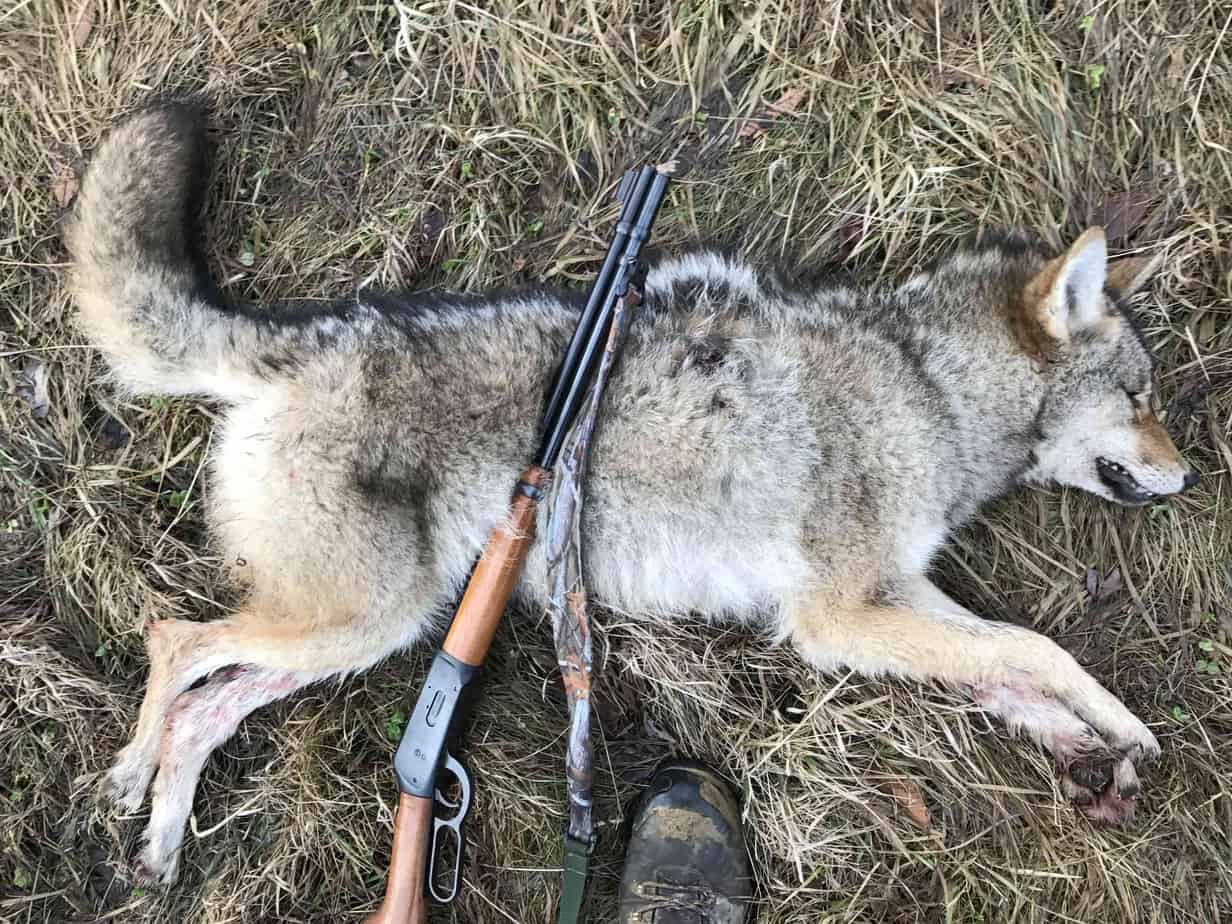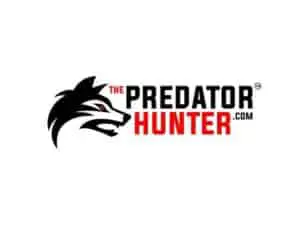The rules for hunting coyotes in New York could almost be called “liberal.” While our DEC maintains the coyote population hovers around 30,000, many experienced New York coyote hunters disagree. However, we all agree that New York is one of the best states to hunt the giant eastern coyote.
Always make sure you check for a read any new updates or changes to the laws of this state. You bear full responsibility for any actions you take while hunting.

In New York, the coyote hunting season begins on October 1 and ends on March 27. Coyotes may be taken day or night with a NY State hunting license. Bait, dogs, and electronic callers are permitted. There are no bag limits.
The number of coyotes in this state can be mind boggling. So, walk quietly to your stand—you may take your first shot before getting there.
Related: Read all the New York Hunting Seasons.
Related: Learn the rules for hunting fox in New York.
Related: Learn the rules for hunting bobcats in New York.
The rules for hunting coyotes in New York.
You may be pleasantly surprised by how few rules we have regarding coyote hunting in New York.
The things you cannot use:
- No non-compliant AR’s. AR’s must be NYS compliant. Do not just bring one in from another state, either. If you are a nonresident using your own firearm, check out state’s firearms laws.
- No suppressors. These devices are illegal in New York.
- No automatic weapons.
Things you can use:
- Electronic callers.
- Bait.
- Night vision, infrared, and thermal riflescopes.
Related: If this is your first time hunting eastern coyotes in New York, I recommend the following articles:
- What color light to use for hunting coyotes—click here.
- The best time of day to call an eastern coyote—click here.
- The two most used and effective sounds—click here.
- The best infrared scope for new predator hunters—click here.
Can you shoot a problem coyote on your property?
In New York, under certain, well-defined circumstances, yes.
Read the specific law here.
Check out my night hunting predator books!
Hunting coyotes in New York requires lots of land.
The more properties have to hunt on, the more coyotes you will take in NY.
If you have limited properties, you must use them wisely.
Do not over hunt them. Read this article.
Know how far apart you stand must be. Learn how to here.
At the very least, you have to ask for permission to hunt private property. Here are a few tips on how to ask.
Hunting public land.
New york has a lot of public land. You can learn how to find and access it here.
If there is a trick to hunting public land in New York, it is this—its close range, shotgun work. Make sure you know how to hunt predators with a shotgun.
Purchase a New York Hunting License here.
Hunting eastern coyotes in New York.
Time after time, a wounded coyote must be tracked down in this state. We have seen some large dogs walk off several shots.
You can either avoid this by knowing where to shoot a coyote—read here.
Or, learn how to track a wounded coyote—read here.
Trespassing Laws for hunters in New York.
The Environmental Conservation Law (ECL) (leaves DEC website) does not allow hunters to enter private property without permission or to use private property to access public lands and waters. Hunters must avoid using private property for access to public lands and waters and must not enter areas posted with a warning for trespass. Trespassing is illegal even on unposted property. At any time, anyone asked to leave a property (posted or not) by the landowner, occupant, or authorized person, must do so immediately.
If a hunter wounds game, they must obtain permission from the landowner prior to accessing the land in pursuit of the wounded game. If permission is refused, the hunter may not access the property in pursuit. DEC cannot compel a landowner to grant access. If the hunter has reason to believe the landowner intends to illegally possess the wounded game, that should be reported to a NYS Environmental Conservation Officer.
Trespassing on areas posted against trespass pursuant to the Environmental Conservation Law is punishable by a fine of up to $250 and/or up to 15 days in jail.
ASK Stickers

ASK Permission Sticker
Permission to access property can be granted to specific individuals. An individual should make contact with landowners, requesting permission to access land for a particular use (hunting, tracking wounded game, etc). Access to the property is dependent on the landowner’s discretion. While verbal agreements are common, written permission from the landowner bars prosecution of trespass, therefore it is the recommended process. For the landowner’s convenience, the DEC provides, free of charge, small ASK permission stickers that can be attached to posted signs to provide a visual indicator that permission for access may be granted upon request. Some landowners find written permission a convenient way to get to know guests and to keep track of them. They write simple notes or make homemade forms granting permission.
The DEC also provides free blank Landowner Permission Records (PDF), as well as ASK Permission Brochures (PDF)explaining the program. Physical copies of these forms are also available free from DEC regional Wildlife offices, or by writing to NYSDEC, Bureau of Wildlife, Albany, NY 12233-4754.
Landowners and lawful occupants are encouraged to allow access to responsible individuals requesting access. Many are people who respect property, people, and the environment. Responsible guests can help you care for your property. DEC relies on hunting as one of the tools of wildlife management. Regulated hunting and trapping help control wildlife populations to avoid disease, unhealthy wildlife, environmental damage, crop and ornamental plant damage, and highway accidents.
Read more regarding Posting Your Land, Public Rights of Navigation, and Accessing and Navigating Waterways.
Discharging a Firearm while Hunting near Dwellings
The Environmental Conservation Law (ECL) generally prohibits discharge of firearms within 500 feet of a dwelling or other occupied structure, unless permission is received from the owner. However, for waterfowl hunting, the NYS Legislature recognized that human settlement patterns and waterfowl habits warranted special consideration. When hunting ducks or geese that congregate on near-shore waters, it is safer for a hunter to shoot away from shore than to shoot toward shore from open water. In recognition of this, the ECL specifies that when hunting waterfowl and shooting over water, discharge of firearms within 500 feet of a dwelling is allowed, as long as there is not any dwelling, public structure, livestock, or person within 500 feet of the shooter in the direction they are shooting.
Your responsibilities while hunting coyotes in New York
Hunter behavior is often scrutinized by the public. Inappropriate actions or simple poor judgment by just a few hunters can lead to controversy and result in the call for additional laws, regulations, or local ordinances that would restrict all hunters.
It is important that hunters be aware of and obey all state hunting laws, as well as any local discharge ordinances. When using public lands and waters, it is essential that hunters access these areas legally.
Hunters also must show ethical and courteous behavior to local residents. A little courtesy and time spent before a hunt can go a long way to avoid or minimize problems. Here are some suggestions:
- Consider contacting landowners adjacent to where you will be hunting, well in advance of your hunt. Let them know when and where you will be hunting. They may be less concerned if you only plan to hunt a few days or at certain times of the day.
- Take the time to explain to the landowner your intent to abide by the laws and regulations pertaining to hunting, your familiarity with the locations of houses, and your desire to be safe.
- Plan out your shooting directions, and verify that the spot you choose to hunt is safe and in compliance with the law. Keep in mind that shot pellets, especially when discharged at a high angle, can sometimes travel farther than 500 feet.
- Identify any concerns the landowner may have and discuss them before you go hunting.
- Leave your hunting location as clean as you found it. Be sure to pick up your empty shell casings and other litter you may find.
- In urban and suburban areas, be particularly mindful that prior permission from neighboring landowners is necessary to allow you to track and/or retrieve wounded game.

